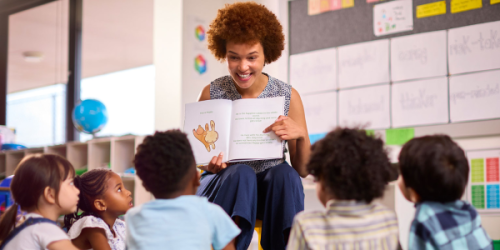Two years ago, when I was working at the Massachusetts Department of Elementary and Secondary Education, we decided to offer teachers professional development sessions aligned with scientifically based reading instruction and delivered by highly qualified and vetted local and national providers—at no cost. Skeptics told us that it was a foolish endeavor; teachers were overwhelmed by the burdens of the pandemic, they worried. There was no way, they said, that we could convince teachers to sign up for these sessions.
What do you think happened? Within two hours after we opened the registration, the sessions were completely oversubscribed—and teachers and districts were calling and pleading with us to create more slots.
Teachers want to learn how to effectively teach their students to read—as we saw from this PD offering in Massachusetts. And teachers are the first to tell us that there is a national reading crisis and we are failing to teach millions of our nation’s students to read.
Each year, thousands of brand new teachers exit hundreds of teacher training programs across the country only to find that they’re unprepared to help their students master the skills and knowledge they need to become strong readers.
Many teachers don’t even know what they’re lacking, nor do they realize that, in some cases, they’ve been taught discredited methods of instruction.
I cannot accept this. Our children deserve well-prepared teachers. And our teachers deserve better training.
Last week, the National Center for Education Statistics released the NAEP long-term trend results in reading and mathematics for 13-year old students, confirming once again that student achievement in reading and math has declined: Four points down in reading and nine points in math compared to the 2019-2020 school year. These dismal results are not the fault of students themselves, but rather a lack of access to effective instruction.
In reading, specifically, performance sagged for 13-year olds at all levels, including higher and lower performing students.
The pandemic struck students hard and led to lagging attendance, increased depression and anxiety, learning loss, and for some, lives forever changed by personal tragedy. Academics took a hit too, but high rates of reading failure long preceded the pandemic. As educators and policymakers continue to rebuild a broken education system, we must include improved reading instruction at the foundation.
To achieve this at scale, teacher preparation programs must prepare aspiring teachers in the instructional methods that we know work best, also known as “scientifically based reading instruction,” and abandon debunked practices. Teachers are hungry for the knowledge and skills to make a positive impact on their students. And they can only be satiated when teacher preparation programs respond to this hunger and take more responsibility for PreK-12 student outcomes.
To that end, NCTQ recently released the Teacher Prep Review: Strengthening Elementary Reading Instruction. This analysis of nearly 700 elementary teacher preparation programs examined widely agreed-upon criteria developed in partnership with reading experts. We found divergence in the field: While 25% of teacher prep programs adequately address all five core components of the scientific research on reading (phonemic awareness, phonics, fluency, vocabulary, and comprehension), another 25% do not adequately address any of the five core components. Additionally, we found over 40% of programs still teach aspiring teachers multiple practices contrary to the research. This is confusing at best for pre-service teachers, and at worst, can impede students in becoming effective and efficient readers.
Lest we feel paralyzed by these findings, we also saw that it is possible to strongly prepare aspiring teachers aligned to the science of reading.
We found that 160 programs (23%) adequately cover all five core components and teach few (or no) practices contrary to the science. We also saw that in states that designed comprehensive, coherent approaches to improving reading outcomes and focused closely (and bravely) on strong implementation, including support and accountability, teacher prep improved.
Download a summary of your state’s reading policies and recommendations |
To strengthen reading outcomes, aspiring teachers need content knowledge, too! Years of cognitive research has shown background knowledge in key subject areas, like science and social studies, is essential to reading comprehension, helping students not only understand the meaning of a text, but also interpret new words and ideas. As such, NCTQ also examined the extent to which aspiring teachers receive a strong foundation in social studies and science content in the Teacher Prep Review: Building Content Knowledge. To make the analysis actionable, we created the Building Content Knowledge: Content Coverage Tool. The tool provides individual teacher preparation programs with a personalized analysis of two important components:
- Whether the program’s requirements (or institution’s general education requirements) adequately cover key topics in science and social studies aligned with academic standards for students (such as studying forces, waves and energy or engineering design).
- Guidance on which courses the program could require or recommend to best prepare future teachers to pass content licensure exams, teach the breadth of elementary curricula, and, ultimately, boost students’ reading comprehension.
As we continue to focus on supporting and accelerating student learning, we cannot afford to overlook an immensely effective tool: well-prepared teachers. When we provide teachers with the knowledge and skills of how to teach reading—aligned to the scientific research base—we will lift the outcomes for students at scale and upend persistent inequities. We’ve estimated that new teachers reach over four million students each year as nearly 170,000 new teachers enter classrooms. Four million is a lot of students. So think of just one student you know for whom one teacher made a huge difference.
Think also about the teacher who told us that she was so frustrated to have to take more courses “on her own time and her own dime” to make up for what she did not learn in her teacher prep program. She told us that she trusted the institution to prepare her—and was devastated when she felt ineffective in teaching children to read.
We owe it to teachers and their students to prepare aspiring educators to successfully teach children to read. From my experience in Massachusetts two years ago and from what I’ve seen since, teachers demand it and, as a country, we need to be opening up as many opportunities as we can to give it to them.
More like this

Bridging the gap: Recruiting teachers trained in the science of reading
What can districts do to secure teachers prepared to teach scientifically based reading instruction?

Ten maxims: What we’ve learned so far about how children learn to read by Dr. Reid Lyon
Together we can address the literacy crisis head-on, reversing historical patterns of inequity and changing the lives of millions of our children.

Teaching reading is brain science
What many still don’t recognize is that teachers’ reading instruction changes the wiring in children’s brains.

